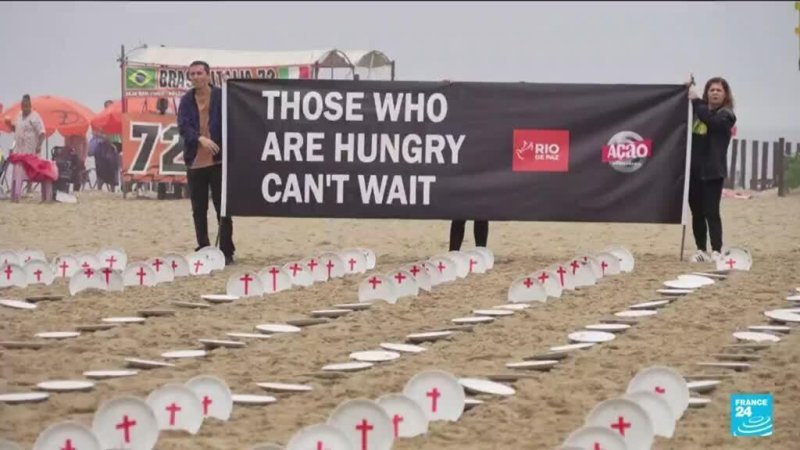Activists highlight plight of world’s hungry ahead of G20 summit in Brazil
3 min read

Ahead of the G20 summit in Brazil, activists took to Copacabana beach in Rio de Janeiro to protest the growing global issue of hunger. On Saturday, November 16, members of the NGO Rio da Paz (Rio for Peace) scattered 733 empty plates across the sandy shoreline as a powerful visual demonstration. The plates were symbolic, representing the millions of people around the world who face hunger and food insecurity.
The G20 summit, which will begin on Monday, November 18, brings together leaders from the world’s wealthiest nations to discuss global challenges, including the fight against poverty and hunger. The protest was organized in an effort to draw the attention of these leaders to the urgent need for action to address food insecurity, a crisis that continues to affect millions worldwide.
According to the United Nations, around 733 million people suffered from hunger in 2023, a staggering figure that reflects the scale of the global food crisis. The number 733 was chosen by the protesters because it highlights the fact that, on average, one in eleven people globally—and one in five people in Africa—are experiencing severe hunger. This serves as a stark reminder of the inequalities that persist in access to food, even in a world where food production is more than sufficient to feed the global population.
This demonstration comes just days before the G20 summit kicks off in Rio de Janeiro. Hunger and poverty are central issues for Brazil, which currently holds the presidency of the G20. The country has made reducing poverty and hunger a priority of its presidency, and it was Brazil that proposed the creation of a global alliance against hunger and poverty, which will be formally launched at the summit. This new initiative aims to foster cooperation among the world’s leading economies to take concrete steps toward eradicating hunger and improving food security.
The G20 countries have committed to accelerating efforts to reduce global hunger and poverty, with a focus on practical actions to be implemented between 2025 and 2030. The hope is that through joint efforts, the member nations can create sustainable solutions that will address the root causes of hunger, including inequality, climate change, and conflict.
The timing of this protest was also significant, as it coincided with the observance of the 8th annual World Day of the Poor, which falls on November 17. This global observance, initiated by the Catholic Church, aims to raise awareness about the challenges faced by those living in extreme poverty and to promote solidarity with the poor.
While world leaders gather in Rio to discuss global economic challenges, activists like those from Rio da Paz are pushing for concrete commitments to ensure that the voices of the hungry and marginalized are heard. The G20 summit represents a critical moment for world leaders to take meaningful action on hunger and poverty. With over 700 million people still facing hunger worldwide, the pressure is on the world’s richest nations to step up and make real progress in the fight against food insecurity.
As the summit begins, it remains to be seen how much of an impact the protests and public pressure will have on the negotiations and agreements reached at the event. For the activists, the goal is clear: to ensure that hunger is not overlooked and that the commitments made by world leaders translate into tangible solutions for those in need.
The protest in Rio is a reminder that while political leaders gather to discuss global issues, the lives of millions of people are directly affected by the decisions they make. In a world of immense wealth, hunger remains an urgent and solvable problem—one that requires immediate and sustained action from all nations.